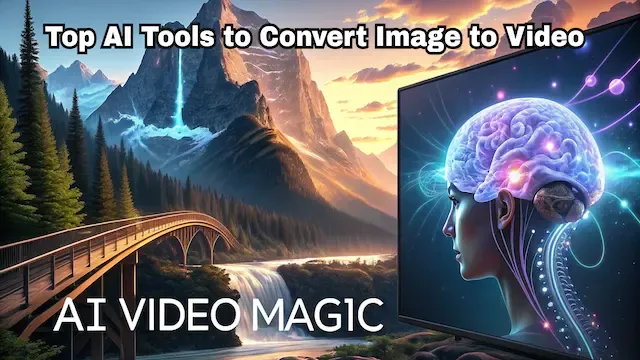How to Humanize AI Text and Avoid Turnitin's AI Detector



Transform your static images into dynamic, engaging videos with the best AI-powered tools in 2025.
12 Tools Tested Free & Paid Options 2025 Updated
Have you ever looked at a stunning photograph and wished it could come to life? That's the magic promised by the new wave of image-to-video AI tools. What once required expensive software and days of painstaking animation can now be achieved in minutes.
AI has fundamentally changed the game. These powerful tools can intelligently animate characters, create cinematic camera movements, and generate entire scenes from a single picture, all while maintaining remarkable character consistency. This guide breaks down the 12 best tools available in 2025, helping you turn your still images into compelling video content.
💡 Quick Fact: The image-to-video AI market is expected to reach $2.8 billion by 2025, with over 80% of content creators now using AI tools regularly.
AI image-to-video converters are for anyone looking to create engaging visual content without the steep learning curve of traditional video editing. This technology is particularly useful for:
Before AI: The Old Way
Creating video required hours of complex editing in software like After Effects, a powerful computer, and specialized animation skills. A simple 10-second clip could take an entire day.
After AI: The New Way
Upload an image, type a simple prompt like "camera pans slowly to the right," and an AI model generates a professional-quality video in minutes. The process is now accessible to everyone.
A powerful Chinese AI tool with surprisingly high quality and 100 daily free credits, making it perfect for regular use.
✅ Best for: Quick, high-quality social media clips.
Google's latest model delivers impressive, realistic motion and is a top contender for professional-looking free content.
✅ Best for: High-quality results without a subscription.
Offers unlimited free generations with no watermark, making it an excellent choice for experimentation and bulk content creation.
✅ Best for: Prototyping and testing different animation ideas.
The industry leader for creating videos with professional AI avatars. Offers over 230 stock avatars and 140+ languages.
✅ Best for: Corporate training videos and business presentations.
Provides advanced, cinematic controls like "Motion Brush" and camera adjustments, giving you unparalleled creative freedom.
✅ Best for: Filmmakers and creative projects requiring fine-tuned control.
Excels at generating videos with high-quality, smooth motion and excellent character consistency across clips.
✅ Best for: Character animations and narrative storytelling.
The original interactive chart is not Blogger-safe. Here is a static, informational summary of its findings:
Tools: Hailuo AI, Google Veo 2.
Summary: These tools offer high quality (7-8/10) for a price of $0. They provide the best starting point for anyone new to AI video.
Tools: Runway, Luma AI.
Summary: For a monthly cost of $12-$30, you get a significant boost in quality (8-9/10) and access to advanced creative features, making them ideal for serious creators.
Tool: Synthesia.
Summary: At $29/mo, it offers the highest quality (9/10) for a specific purpose: professional avatar-based presentations and training videos.
The process is simple and similar across most platforms:
When using AI video generators, it's important to be mindful of copyright and personal likeness. Only use images that you own the rights to or that are properly licensed. Avoid using images of people without their consent, as creating a video could violate their privacy rights.
The interactive quiz is not Blogger-safe. Instead, use this simple guide to find the best tool for your needs:
Google has made Veo 2 publicly available with impressive quality improvements and support for image-to-video generation. Try Google Veo 2 →
Hailuo AI has increased their daily free credits to 100, making it even more accessible for content creators. Get Free Credits →
Runway has added 4K upscaling capabilities to their Gen-3 model, competing directly with traditional upscaling tools. Learn More →
Sora is now available to ChatGPT Plus subscribers, bringing high-quality video generation to the masses. Access Sora →
The world of AI image-to-video tools is evolving at an incredible pace. There has never been a better time to start experimenting. Begin with a free tool, focus on telling a great story, and watch as your static images come to life.
Hailuo AI currently offers the best free experience with 100 daily credits and good quality output. Google Veo 2 is also excellent for free users. For unlimited free use, try Alibaba Qwen, though quality may vary.
No! That's the beauty of these tools. Simply upload your image, write a brief description of the motion you want, and the AI handles everything else. They are designed for beginners.
Most paid tools offer commercial licenses, but free versions often have restrictions. Always check the specific terms of service for each tool. Synthesia, Runway, and Luma all offer commercial rights with their paid plans.
Paid tools typically offer higher quality output, longer video duration, no watermarks, faster processing, advanced features, and commercial licensing. Free tools are great for testing but may have limitations.
If you own the original image, you typically own the AI-generated video. However, be cautious with copyrighted images or faces of real people without permission. Always use your own images or properly licensed stock photos to avoid legal issues.
Comments
Post a Comment